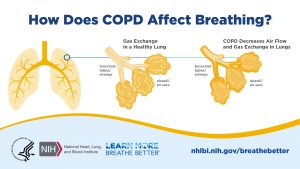Nov
01

Posted by seancorning on November 1st, 2021
Posted in: Blog
Organized each November by the National Heart, Lung and Blood Institute (NHLBI), National COPD Awareness Month aims to promote better understanding of COPD. COPD is a progressive lung disease which makes it difficult to breathe. Progressive means that it gets worse over time. While COPD rates have declined in recent decades, it is still the 4th leading cause of death and 3rd most common cause of disability. More than 16 million people in the US are currently living with COPD. The prevalence of COPD varies greatly by state. The CDC has put together a series of state-specific COPD fact sheets which provide targeted information and statistics. 
COPD can have many causes but is often preventable. According to the NHLBI, around 75% of COPD cases are linked to cigarette smoking. In addition to smoking, COPD can be caused by exposure to other lung irritants like air pollution, fumes or dust. In rare cases, it can also have a genetic component related to alpha-1 antitrypsin deficiency.
COPD can present in different ways, with the two main underlying conditions being emphysema and chronic bronchitis. With emphysema the air sacs in the lungs become damaged, leading to difficulty absorbing oxygen and expelling carbon dioxide. With chronic bronchitis the bronchial tubes become inflamed, swollen and irritated. This causes mucus to build up and makes breathing difficult. Most individuals with COPD experience both emphysema and chronic bronchitis, though to what extent varies from person to person.
COPD can have a wide variety of symptoms and according to the NHLBI the most common are:
These symptoms can be mild at the start and become progressively worse over time. While there is no cure for COPD, lifestyle changes and other treatments can slow progression and improve the ability to breathe. Reducing one’s exposure to the cause of COPD, whether smoking or another lung irritant, can slow the progression of the disease. Other treatments include bronchodilators, anti-inflammatory medications and combination medicines.
Be sure to check out the NHLBI’s National COPD Awareness Month page to learn more!